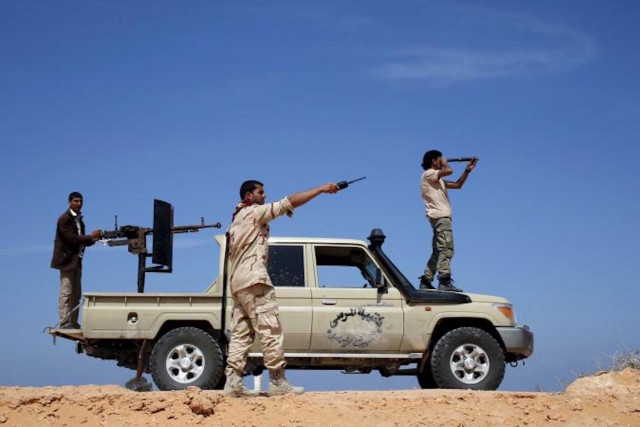Islamic State’s top commanders have begun to seek refuge in Libya, according to a statement made this week by a senior intelligence official in the country. Western and local leaders are now considering new moves to counter the threat from jihadists that has flourished in lawless areas since the overthrow of longtime dictator Muammar Qaddafi in 2011.
Speaking to the BBC, head of intelligence for the city of Misrata, Ismail Shukri, described an influx of foreign fighters in recent months. Reports suggest about 3,000 Islamic State fighters now control the coastal city of Sirte, bringing with them public crucifixions, beheadings, and the same form of Sharia law that exemplifies Islamic State brutality. Shukri estimates that non-Libyans comprise “around 70%” of the Islamic State’s militiamen, “most of them are Tunisians, followed by Egyptians, Sudanese and a few Algerians.” Others from Iraq and Syria have roots in Saddam Hussein’s disbanded army. Meanwhile, Islamic State leaders with “long-term importance” to the group are quietly relocating away from the pressures of coalition airstrikes, he said. “They view Libya as a safe haven.”
With the backdrop of a rising Islamic State presence in Libya, diplomats from 23 countries met this week in Rome to discuss how to fight the worldwide rise of the group’s self-proclaimed caliphate. U.S. Secretary of State John F. Kerry warned that while the American-led coalition had made “undeniable” advances in Syria and Iraq, Libya’s billions of dollars of oil resources could help fuel the the group’s ambitions. However, in a joint statement officials only promised to “continue to monitor closely developments” in the country and “support the Government of National Accord in its efforts to establish peace and security for the Libyan people.”Authorities in Misrata, about 150 miles to the west of Sirte, say they are planning an offensive to oust Islamic State from the city. But media reports suggest that IS fighters outnumber government loyalists by 2:1. A local militia commander, Mohammed al-Bayoudi, lamented he would not be able to destroy IS alone and welcomed NATO support. “Airstrikes alone cannot defeat IS,” he warned, “what the army really needs is logistical support.”
Ultimately, to stop the spread of Islamic State, its terrorism, and its repressive form of Sharia law, a viable partner is needed on the ground. With Libya divided into two rival factions, an internationally recognized government headquartered in the eastern city of Tobruk and the General National Congress (GNC) in Tripoli, radical groups will be able to exploit the chaos for their own gains. U.S. Special Forces, under the direction of President Obama, have been in the country to vet possible militias to ally with since late last year, but without a united central government for others to rally behind, fighting the spread of Islamic State will remain an uphill battle.


